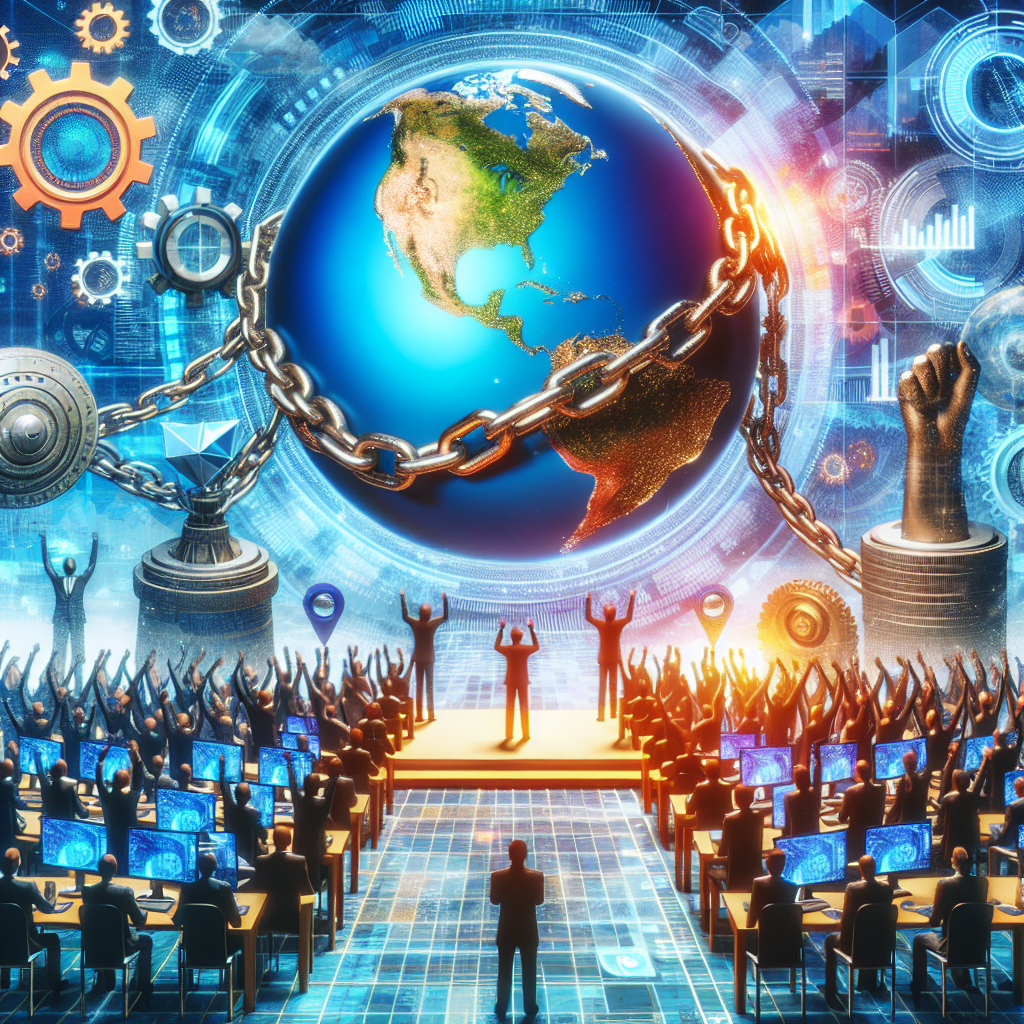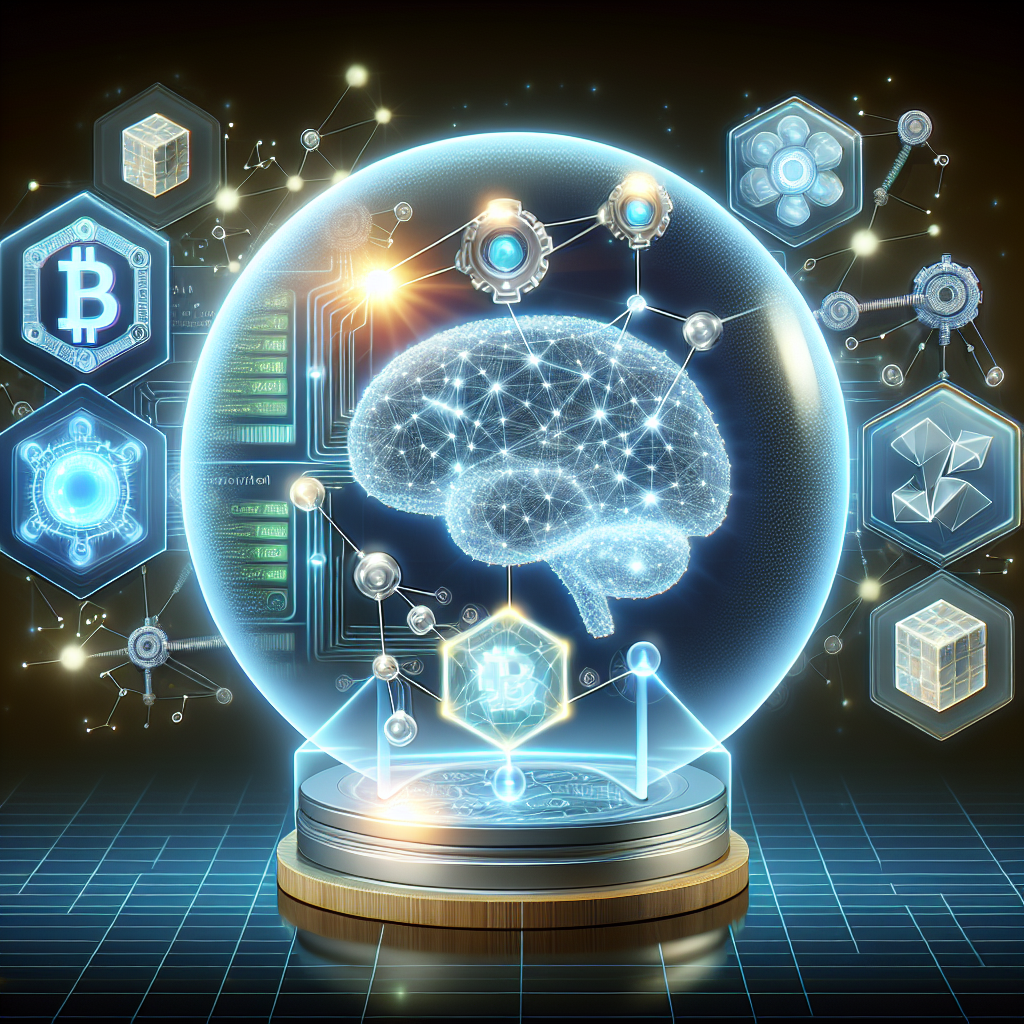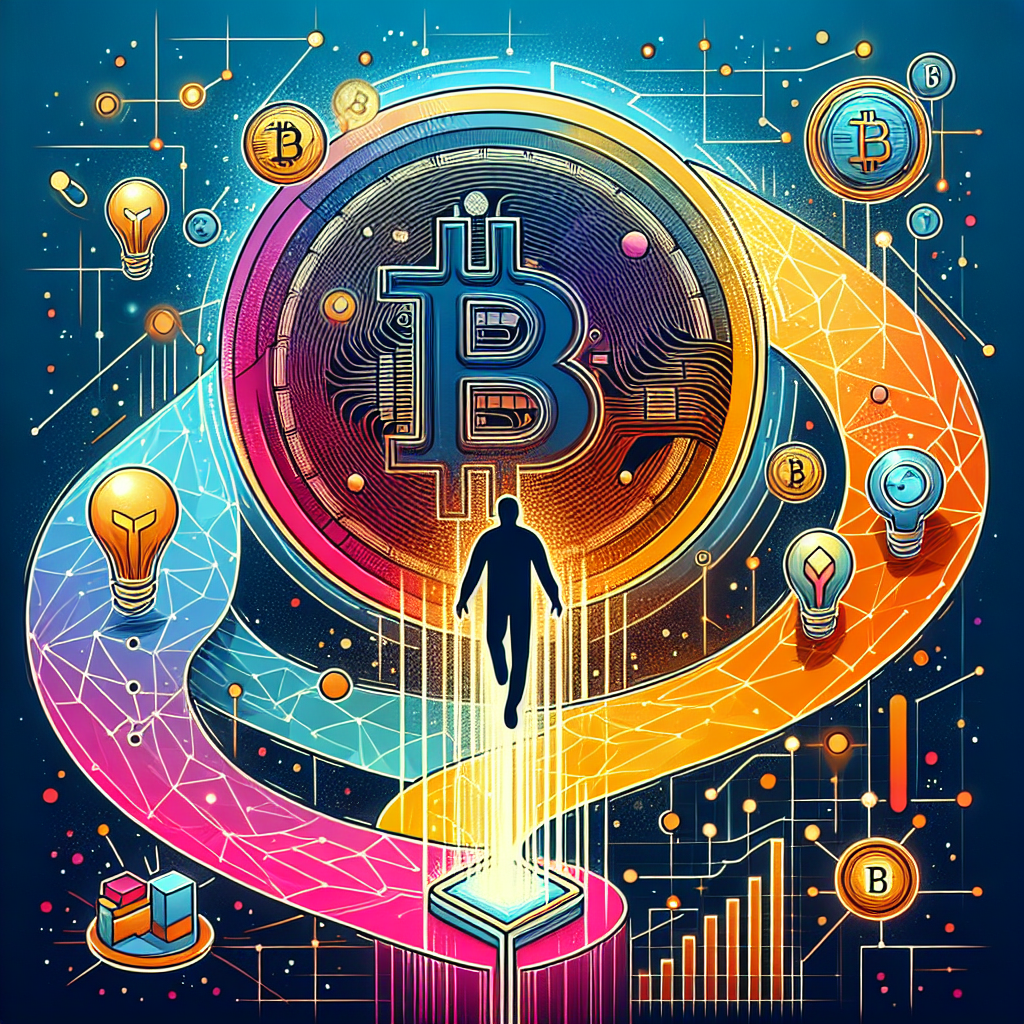Worldcoin Foundation Unveils World Chain: Revolutionizing Global Adoption of World ID
The Worldcoin Foundation, a leading blockchain technology organization, has recently announced the launch of World Chain, a groundbreaking initiative aimed at accelerating the adoption of World ID. This move is set to revolutionize the way individuals establish and verify their digital identities, offering a more secure and efficient solution. With the increasing reliance on digital platforms and the growing concerns surrounding privacy and data breaches, the Worldcoin Foundation’s World Chain has the potential to reshape the way we interact with online services.
In this article, we will delve into the details of the Worldcoin Foundation’s World Chain and explore how it aims to address the challenges associated with digital identity verification. We will examine the current landscape of digital identities, the shortcomings of existing systems, and the potential benefits of adopting World ID. Additionally, we will discuss the implications of this initiative on various sectors, including finance, healthcare, and e-commerce, and how it could pave the way for a more secure and inclusive digital future.
Key Takeaways:
1. The Worldcoin Foundation has announced the launch of World Chain, a revolutionary blockchain platform aimed at accelerating the adoption of World ID.
2. World ID is a digital identity system that aims to provide individuals with a secure and decentralized way to prove their identity online.
3. The World Chain platform will leverage blockchain technology to ensure the privacy and security of user data, making it resistant to hacking and fraud.
4. By using World ID, individuals will have greater control over their personal information and can choose what data they want to share with different entities.
5. The Worldcoin Foundation’s initiative has the potential to revolutionize the way we think about digital identity, paving the way for a more secure and inclusive online ecosystem.
Controversial Aspect 1: Centralization and Privacy Concerns
The announcement of the World Chain by the Worldcoin Foundation has raised concerns regarding centralization and privacy. The World Chain aims to accelerate the adoption of World ID, a digital identification system that would be tied to an individual’s Worldcoin wallet. While the idea of a universal digital ID system may seem appealing, critics argue that it could lead to a concentration of power and a potential invasion of privacy.
One of the main concerns is that the World Chain would be controlled by a single entity, the Worldcoin Foundation. This raises questions about the decentralization of the blockchain and whether it would truly be a public and open network. Critics argue that a centralized system could be susceptible to manipulation, censorship, and abuse of power. They fear that the Worldcoin Foundation could have the ability to control and track individuals’ digital identities, compromising their privacy.
Controversial Aspect 2: Exclusion of the Unbanked and Marginalized Communities
Another controversial aspect of the World Chain is its potential exclusion of the unbanked and marginalized communities. The Worldcoin Foundation aims to provide a universal digital ID system, but this assumes that everyone has access to the necessary infrastructure and resources to participate in the digital economy.
Many individuals in developing countries or marginalized communities do not have access to smartphones, reliable internet, or even basic identification documents. Implementing a digital ID system without addressing these barriers could further marginalize those who are already excluded from traditional financial systems. Critics argue that the World Chain should prioritize inclusion and ensure that no one is left behind in the race towards digital identification.
Controversial Aspect 3: Security and Vulnerabilities
The security and vulnerabilities of the World Chain and the World ID system are also a cause for concern. While blockchain technology is known for its security features, no system is entirely immune to vulnerabilities and attacks.
Implementing a universal digital ID system on a blockchain raises questions about the potential for data breaches and identity theft. Critics worry that a centralized database containing sensitive personal information could become a prime target for hackers. They argue that the Worldcoin Foundation must invest heavily in robust security measures and regular audits to mitigate these risks.
Additionally, there are concerns about the potential for false identities and identity fraud within the World ID system. Critics argue that if the system is not properly designed and implemented, it could be exploited by individuals seeking to create fake identities or engage in illegal activities.
In conclusion, the Worldcoin Foundation’s announcement of the World Chain and World ID system has sparked controversy on several fronts. The concerns regarding centralization and privacy, exclusion of marginalized communities, and security vulnerabilities highlight the need for careful consideration and transparency in the implementation of such a system. While the idea of a universal digital ID system has its merits, it is crucial to address these controversies and ensure that the benefits outweigh the potential risks.
The Worldcoin Foundation
The Worldcoin Foundation is a non-profit organization dedicated to promoting the adoption of blockchain technology and digital currencies. Founded in 2020, the foundation aims to create a more inclusive and equitable financial system by leveraging the benefits of decentralized finance. The foundation’s latest announcement of the World Chain is set to revolutionize the way we think about identity verification and accelerate the adoption of World ID.
What is World ID?
World ID is a digital identity verification system built on the World Chain, a blockchain network developed by the Worldcoin Foundation. It aims to provide individuals with a secure and decentralized way to prove their identity online. World ID eliminates the need for traditional identity documents and allows users to control their personal data, giving them greater privacy and security.
The Benefits of World ID
World ID offers several advantages over traditional identity verification methods. Firstly, it provides a more secure and tamper-proof way to verify an individual’s identity. The use of blockchain technology ensures that the data cannot be altered or manipulated, reducing the risk of identity theft and fraud.
Secondly, World ID offers greater privacy and control over personal data. With traditional identity verification methods, individuals often have to share sensitive information with multiple parties, increasing the risk of data breaches. World ID allows users to share only the necessary information, keeping their personal data secure.
Lastly, World ID has the potential to streamline various processes that require identity verification. For example, opening a bank account or applying for a loan can be time-consuming and cumbersome due to the extensive documentation required. With World ID, these processes can be simplified, saving time and effort for both individuals and institutions.
The World Chain
The World Chain is a blockchain network developed by the Worldcoin Foundation specifically for the World ID system. It is designed to be scalable, secure, and efficient, capable of handling a large volume of identity verification transactions. The World Chain utilizes a proof-of-stake consensus mechanism, which ensures the integrity of the network and allows for faster transaction processing.
One of the key features of the World Chain is its interoperability with other blockchain networks. This means that World ID can be integrated with existing blockchain-based applications and platforms, expanding its potential use cases and adoption.
Use Cases for World ID
World ID has a wide range of potential use cases across various industries. One example is in the financial sector, where identity verification is a crucial component of regulatory compliance. With World ID, financial institutions can streamline their customer onboarding processes while ensuring compliance with Know Your Customer (KYC) and Anti-Money Laundering (AML) regulations.
Another use case is in the healthcare industry, where secure and accurate patient identification is essential. World ID can enable seamless sharing of medical records between healthcare providers, improving patient care and reducing administrative burdens.
Additionally, World ID can be used in the education sector to verify academic credentials and certifications. This can help prevent fraud and ensure the validity of qualifications, benefiting both educational institutions and employers.
World ID and Global Inclusion
One of the main goals of the Worldcoin Foundation is to promote financial inclusion on a global scale. World ID plays a crucial role in achieving this goal by providing individuals in underserved communities with a secure and accessible means of identity verification.
In many developing countries, a significant portion of the population lacks access to traditional identification documents, making it difficult for them to participate in the formal economy. World ID can bridge this gap by providing a digital identity solution that is accessible to anyone with a smartphone and internet connection.
By enabling individuals to prove their identity, World ID opens up a world of opportunities, including access to financial services, education, healthcare, and more. This has the potential to uplift communities and drive economic growth in regions that have been historically marginalized.
Challenges and Considerations
While World ID offers numerous benefits, there are also challenges and considerations that need to be addressed. One of the main concerns is privacy and data protection. As with any digital identity system, there is a risk of data breaches and unauthorized access. The Worldcoin Foundation must prioritize robust security measures and ensure that user data is adequately protected.
Another challenge is the adoption and integration of World ID by various stakeholders. For the system to be effective, it needs to be widely accepted and integrated into existing processes and systems. This requires collaboration with governments, businesses, and other organizations to ensure seamless integration and widespread adoption.
The Future of World ID
The announcement of the World Chain and World ID by the Worldcoin Foundation marks a significant milestone in the journey towards a more inclusive and secure digital identity system. The potential use cases and benefits of World ID are vast, ranging from financial services to healthcare and education.
As the foundation continues to develop and refine the World Chain and World ID system, it will be essential to address the challenges and concerns surrounding privacy, security, and adoption. With the right approach, World ID has the potential to revolutionize the way we prove our identity and accelerate the adoption of blockchain technology on a global scale.
The Worldcoin Foundation
The Worldcoin Foundation is a non-profit organization dedicated to accelerating the adoption of blockchain technology and digital currencies. Their latest announcement, the World Chain, aims to revolutionize the way we verify and store personal identification information.
The World ID
At the core of the World Chain is the concept of the World ID, a decentralized and secure digital identity that individuals can use to authenticate themselves in various online and offline transactions. The World ID is designed to be tamper-proof, protecting users’ personal information from unauthorized access and ensuring privacy.
Decentralized Storage
One of the key features of the World ID is its decentralized storage. Unlike traditional identification systems that rely on centralized databases, the World ID leverages the power of blockchain technology to distribute and store identity information across a network of nodes. This decentralized approach enhances security by eliminating single points of failure and reducing the risk of data breaches.
By distributing the World ID data across multiple nodes, the World Chain ensures that no single entity has complete control over an individual’s identity information. This not only protects user privacy but also makes it more difficult for malicious actors to manipulate or tamper with the data.
Immutable Records
Another crucial aspect of the World Chain is the immutability of the records stored on the blockchain. Once identity information is added to the World Chain, it becomes virtually impossible to alter or delete. This immutability ensures that the World ID remains a reliable and trustworthy source of verification, as any changes made to the data can be easily detected.
Immutable records are achieved through the use of cryptographic hashing algorithms. Each piece of identity information is hashed, generating a unique digital fingerprint that represents the data. This fingerprint is then stored on the blockchain, linking it to the individual’s World ID. Any attempt to modify the data would result in a different hash value, alerting the network to potential tampering.
Smart Contracts for Verification
The World Chain utilizes smart contracts to facilitate the verification process. Smart contracts are self-executing contracts with the terms of the agreement directly written into code. In the case of the World Chain, smart contracts are used to verify the authenticity of identity information without revealing the actual data.
When a user presents their World ID for verification, the smart contract checks the validity of the identity information against predefined rules and conditions. This verification process is automated and eliminates the need for intermediaries, reducing costs and increasing efficiency.
Privacy and Security
Privacy and security are paramount in the World Chain’s design. The use of cryptographic techniques ensures that identity information remains confidential, with only authorized parties able to access specific data. Additionally, the decentralized nature of the World Chain reduces the risk of data breaches, as there is no single point of vulnerability.
Scalability and Interoperability
The World Chain is designed to be scalable and interoperable, capable of handling a large volume of identity verifications across different platforms and applications. By leveraging blockchain technology, the World Chain can process transactions in a decentralized and efficient manner, ensuring a seamless user experience.
Accessibility
The World Chain aims to make digital identity accessible to everyone, including those without access to traditional identification systems. By providing a secure and decentralized solution, the World Chain opens up new possibilities for individuals in underserved regions or marginalized communities to participate in the digital economy.
The World Chain, introduced by the Worldcoin Foundation, brings forth a decentralized and secure approach to digital identity verification. Through the use of blockchain technology, the World Chain ensures privacy, immutability, and efficiency in the verification process. With its focus on accessibility and interoperability, the World Chain has the potential to revolutionize the way we authenticate ourselves in various online and offline transactions.
The Birth of Worldcoin Foundation
The Worldcoin Foundation was established in 2013 as a non-profit organization with the aim of promoting the adoption and development of cryptocurrencies. At the time, Bitcoin was the dominant player in the market, but there was growing interest in exploring alternative digital currencies.
The foundation’s founders, Luke Mitchell and Alexander Bulkin, envisioned a global cryptocurrency that could overcome some of the limitations of Bitcoin, such as its slow transaction processing times and high energy consumption. They believed that a new digital currency, known as Worldcoin, could offer a more efficient and sustainable solution.
The World ID Concept
In 2014, the Worldcoin Foundation introduced the concept of World ID, a unique digital identity that could be used to authenticate and verify individuals in various online transactions. The idea was to create a decentralized identity system that would provide a secure and reliable way to establish trust between parties.
The World ID concept gained traction among privacy advocates and those who were concerned about the increasing centralization of personal data by large corporations. The foundation saw an opportunity to address these concerns by leveraging blockchain technology to create a decentralized identity solution.
The World Chain Initiative
In 2017, the Worldcoin Foundation announced the World Chain initiative, a project aimed at accelerating the adoption of World ID and further developing the Worldcoin ecosystem. The World Chain would serve as the underlying blockchain infrastructure for Worldcoin and provide the necessary tools and protocols for building decentralized applications.
The World Chain initiative received significant attention from both the cryptocurrency community and mainstream media. Many saw it as a potential game-changer in the world of digital identity and blockchain technology. The foundation started collaborating with various organizations and experts to refine the World Chain’s technical specifications and ensure its scalability and security.
Challenges and Evolution
Over the years, the Worldcoin Foundation faced numerous challenges in realizing its vision. One of the main hurdles was gaining widespread adoption of World ID. Despite its potential benefits, convincing individuals and organizations to embrace a new digital identity system proved to be a daunting task.
The foundation also faced competition from other blockchain projects that were exploring similar concepts. Rival cryptocurrencies and decentralized identity platforms emerged, offering alternative solutions to the same problems that the Worldcoin Foundation sought to address.
In response to these challenges, the Worldcoin Foundation shifted its focus towards collaboration and partnerships. It actively sought alliances with other blockchain projects and organizations working on digital identity solutions. By joining forces, the foundation aimed to foster interoperability and create a more inclusive ecosystem for decentralized identity.
The Current State
As of 2021, the Worldcoin Foundation continues to develop the World Chain and promote the adoption of World ID. The project has evolved to incorporate advancements in blockchain technology, such as the integration of smart contracts and the exploration of privacy-enhancing features.
The foundation has also expanded its efforts to engage with governments and regulatory bodies to address legal and compliance issues surrounding digital identity. It recognizes the importance of establishing a regulatory framework that protects user privacy while fostering innovation and adoption.
While the Worldcoin Foundation’s journey has been marked by challenges and competition, it remains committed to its mission of creating a decentralized and secure digital identity solution. The foundation’s efforts, combined with the broader advancements in blockchain technology, have the potential to reshape the way we establish trust and manage our digital identities in the future.
Case Study 1: World ID Facilitates Secure Digital Identity Verification in Developing Countries
In a remote village in Kenya, accessing basic services such as healthcare and education used to be a challenge due to the lack of proper identification documents. However, the implementation of World ID by the Worldcoin Foundation has revolutionized the lives of the villagers.
With the help of World ID, individuals in the village can now easily verify their identities using their biometric data, which is securely stored on the World Chain. This has enabled them to access government services, open bank accounts, and even participate in the digital economy.
One success story from the village is that of Jane, a young girl who was previously unable to attend school due to the lack of identification. With World ID, Jane’s biometric data was recorded, and she was able to enroll in school, unlocking a world of opportunities for her future.
This case study highlights the transformative power of World ID in providing secure digital identities to individuals in developing countries, empowering them to access essential services and participate in the global economy.
Case Study 2: World ID Streamlines KYC Processes for Financial Institutions
Financial institutions around the world face significant challenges when it comes to Know Your Customer (KYC) processes. These processes are time-consuming, costly, and often prone to fraud. However, the Worldcoin Foundation’s World ID has emerged as a game-changer in this domain.
Bank X, a leading global bank, implemented World ID to streamline its KYC processes. By leveraging the World Chain, Bank X was able to securely verify the identities of its customers in real-time, eliminating the need for manual document verification.
The results were astounding. Bank X witnessed a significant reduction in operational costs and a drastic improvement in the efficiency of its KYC processes. Moreover, the enhanced security provided by World ID helped prevent identity theft and fraud, safeguarding the bank and its customers.
This case study demonstrates how World ID can revolutionize KYC processes for financial institutions, enabling them to enhance customer experience, reduce costs, and mitigate fraud risks.
Case Study 3: World ID Empowers Refugees to Rebuild Their Lives
For refugees fleeing their war-torn countries, establishing a new life in a foreign land is a daunting task. One of the biggest challenges they face is the lack of identification, which hinders their ability to access basic services and find employment. The Worldcoin Foundation’s World ID has emerged as a lifeline for these individuals.
In a refugee camp in Jordan, World ID was implemented to provide secure digital identities to the displaced population. With their biometric data securely stored on the World Chain, refugees were able to access healthcare, education, and even find employment opportunities.
A success story from the camp is that of Ahmed, a skilled carpenter who was unable to find work due to the lack of identification. With World ID, Ahmed’s skills were validated, and he was able to secure a job, enabling him to support himself and his family.
This case study highlights how World ID can empower refugees to rebuild their lives by providing them with secure digital identities, enabling them to access essential services and find employment opportunities.
FAQs
1. What is the Worldcoin Foundation?
The Worldcoin Foundation is a non-profit organization dedicated to promoting the adoption and development of blockchain technology. It aims to create a more inclusive and transparent global financial system.
2. What is World Chain?
World Chain is a blockchain platform developed by the Worldcoin Foundation. It is designed to accelerate the adoption of World ID, a decentralized digital identity solution, by providing a secure and scalable infrastructure.
3. What is World ID?
World ID is a digital identity solution that allows individuals to have control over their personal data. It provides a decentralized and secure way to verify and authenticate identities, reducing the reliance on centralized authorities.
4. How does World Chain accelerate the adoption of World ID?
World Chain provides a robust and scalable infrastructure for the deployment of World ID. By leveraging blockchain technology, it ensures the security and integrity of identity data while enabling seamless integration with existing systems and applications.
5. What are the benefits of using World ID?
Using World ID offers several benefits, including enhanced privacy, increased security, and improved convenience. It allows individuals to control their personal data and choose which information to share, reducing the risk of identity theft and fraud.
6. How does World ID protect user privacy?
World ID uses a decentralized architecture, which means that personal data is stored on the blockchain in an encrypted form. It ensures that only authorized parties can access and verify the data, protecting user privacy.
7. Can World ID be used for financial transactions?
Yes, World ID can be used for financial transactions. Its decentralized nature and secure infrastructure make it suitable for various applications, including banking, payments, and digital asset management.
8. How can individuals and organizations adopt World ID?
Individuals and organizations can adopt World ID by integrating it into their existing systems and applications. The Worldcoin Foundation provides documentation, APIs, and developer tools to facilitate the integration process.
9. Is World ID compatible with other blockchain platforms?
Yes, World ID is designed to be compatible with other blockchain platforms. It follows open standards and protocols, allowing for interoperability with different blockchain networks.
10. What is the future of World Chain and World ID?
The Worldcoin Foundation envisions a future where World Chain and World ID are widely adopted, transforming the way we manage and verify identities. As blockchain technology continues to evolve, World Chain and World ID will adapt and innovate to meet the changing needs of individuals and organizations.
Concept 1: Worldcoin Foundation
The Worldcoin Foundation is an organization that aims to promote the adoption and use of digital currencies, specifically Worldcoin. They believe that digital currencies have the potential to revolutionize the way we transact and interact with money.
Concept 2: World Chain
The World Chain is a decentralized network that will be built on blockchain technology. A blockchain is like a digital ledger that records all transactions made with a particular cryptocurrency, such as Worldcoin. It is a secure and transparent way of keeping track of who owns what and ensuring that transactions are valid.
By creating the World Chain, the Worldcoin Foundation is essentially building a platform where people can use Worldcoin for various purposes, such as making payments, storing value, or even creating decentralized applications.
Concept 3: World ID
World ID is a digital identity system that will be integrated into the World Chain. It aims to provide a secure and reliable way for individuals to prove their identity online. Currently, many online platforms require users to create accounts and provide personal information, such as names, addresses, and even social security numbers.
With World ID, individuals will have more control over their personal data. Instead of sharing their information with every platform they use, they can provide a unique identifier that is linked to their World ID. This way, users can choose which information to share and with whom, reducing the risk of identity theft and privacy breaches.
World ID also has the potential to streamline processes that require identity verification, such as opening bank accounts or applying for government services. Instead of submitting physical documents and going through lengthy verification procedures, individuals can simply share their World ID, which can be verified instantly on the World Chain.
1. Understand the World ID concept
Before applying the knowledge from the Worldcoin Foundation’s announcement, it is crucial to understand the concept of World ID. World ID is a decentralized digital identity system that aims to provide individuals with control over their personal data. Familiarize yourself with the principles and benefits of World ID to fully grasp its potential in your daily life.
2. Stay updated with Worldcoin Foundation’s developments
To effectively apply the knowledge from the announcement, it is essential to stay updated with the Worldcoin Foundation’s developments. Follow their official channels, such as their website, social media accounts, and newsletters, to receive the latest updates on World ID and related initiatives. This will ensure you have access to the most recent information and can make informed decisions.
3. Explore potential use cases
Consider the various potential use cases of World ID in your daily life. Think about how it can enhance your online security, simplify identity verification processes, and protect your personal data. Explore industries that could benefit from World ID, such as banking, healthcare, and e-commerce, to identify opportunities for its application in your own experiences.
4. Evaluate privacy and security features
When applying World ID in your daily life, it is crucial to evaluate the privacy and security features of the platforms or services you choose to use. Ensure that they align with your personal preferences and requirements. Look for platforms that prioritize data encryption, user consent, and transparent data management practices to safeguard your information.
5. Participate in pilot programs
Keep an eye out for pilot programs or beta testing opportunities related to World ID. Participating in these programs allows you to gain firsthand experience with the technology and provide valuable feedback to the developers. It also enables you to influence the future development of World ID and ensure it meets the needs of its users.
6. Educate others about World ID
Spread awareness about World ID among your friends, family, and colleagues. Educate them about the benefits and potential applications of this technology. By sharing your knowledge, you can help create a network of informed individuals who can collectively contribute to the adoption and success of World ID.
7. Advocate for World ID adoption
Advocate for the adoption of World ID in your community, workplace, or industry. Engage in discussions, attend relevant events, and collaborate with like-minded individuals to promote the use of decentralized digital identity systems. By actively advocating for World ID, you can help accelerate its adoption and create a more secure and privacy-centric digital environment.
8. Provide feedback to the Worldcoin Foundation
Share your feedback, suggestions, and concerns with the Worldcoin Foundation. They value user input and actively seek to improve their technologies based on user experiences. By providing feedback, you can contribute to the ongoing development and refinement of World ID, making it more effective and user-friendly.
9. Collaborate with developers and innovators
Collaborate with developers and innovators in the blockchain and identity space. Engage in discussions, join communities, and participate in hackathons or innovation challenges to connect with like-minded individuals. By collaborating with others, you can exchange ideas, learn from each other, and potentially contribute to the development of new applications or solutions using World ID.
10. Embrace the decentralized future
Finally, embrace the decentralized future that technologies like World ID represent. Understand the potential benefits of decentralized systems, such as increased autonomy, improved security, and reduced reliance on centralized authorities. By embracing this future, you can actively contribute to the adoption and evolution of decentralized digital identity systems like World ID.
The Worldcoin Foundation’s announcement of the World Chain is a significant development in the push for widespread adoption of the World ID system. The World Chain’s decentralized nature and focus on privacy and security make it an attractive option for individuals and organizations looking for a reliable and efficient digital identity solution. By leveraging blockchain technology, the World Chain aims to address the challenges associated with traditional identity systems, such as data breaches and identity theft.
With the World Chain, the Worldcoin Foundation is not only providing a solution for identity verification but also paving the way for a more inclusive and accessible digital economy. The ability to securely and easily verify one’s identity can open up opportunities for individuals in underserved communities, enabling them to access financial services, healthcare, and education. Furthermore, the World Chain’s interoperability with existing systems and its commitment to user control over personal data make it a promising candidate for widespread adoption.




